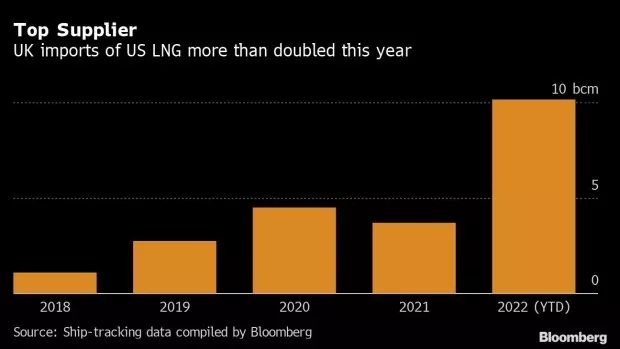London December 7 2022: Britain and the US agreed to work together to ensure liquefied natural gas keeps flowing next year in an effort to underpin energy supplies threatened by Russia’s war in Ukraine.
London and Washington agreed to set up a joint action group that will work “with international partners and industry” to ensure at least 9-10 billion cubic meters of American LNG is delivered to the UK over the next year. While that’s double the amount exported in 2021, it matches the record volume US producers delivered to the UK this year.
“We will look to identify opportunities to support commercial contracts that increase security of supply,” UK Prime Minister Rishi Sunak and US President Joe Biden said in the joint statement. The US commitment includes providing the necessary regulatory environment to achieve the delivery goals.
Britain’s accord is a result of the increased global competition for LNG, especially from Asia and the European Union, where Moscow’s decision to throttle pipeline gas deliveries is threatening to push the continent’s economy into recession. The US-UK agreement provides little clarity on how the LNG supplies will be secured, and Britain has already imported more than 10 billion cubic meters of US LNG this year.
The deal follows a similar agreement the US struck with the EU in March for at least 15 billion cubic meters of additional LNG this year. That accord raised questions over where exactly the supply would come from, as soaring EU gas prices would likely pull the super-chilled fuel to European shores anyway.
While the US filled some of Russia’s supply gap by exporting record amounts of LNG from its seven plants, global markets are going to have to wait at least two more years before any new supplies from America come online. Three large-scale projects requiring more than $30 billion of financing are now under construction in Texas and Louisiana, yet none will be ready next year.
Still, the deal has political significance with the UK’s Sunak trying to forge new trade deals and diplomatic relations with partners outside of Europe. The countries will collaborate on renewables and nuclear projects to reduce global dependence on Russian exports and help stabilize energy markets.
The partnership also aims to drive international investment in clean energy technologies and work to decarbonize the aerospace, aviation and automotive industries, according to the statement. The first meeting of the group will be held virtually on Thursday.










